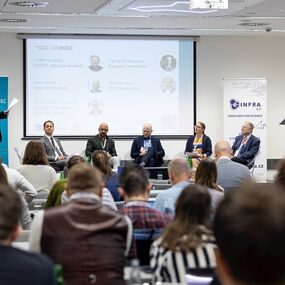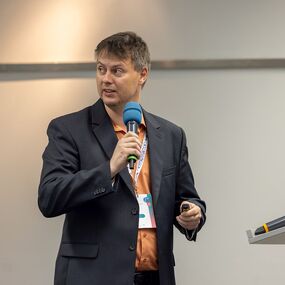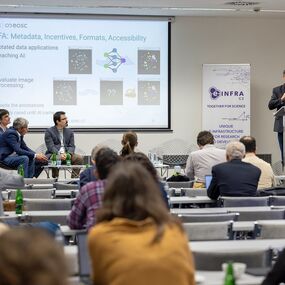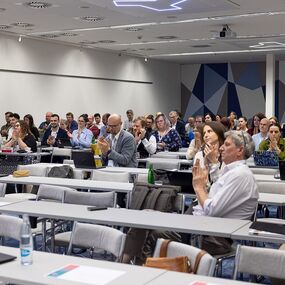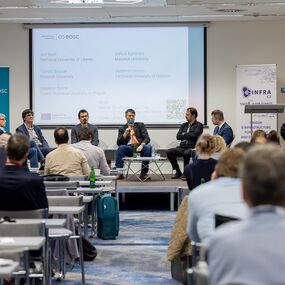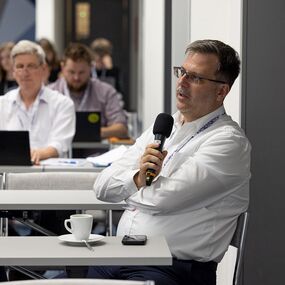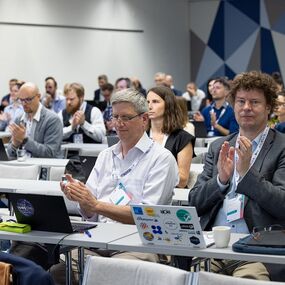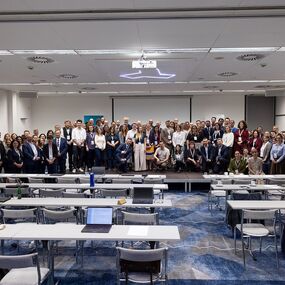On May 21–22, 2025, Brno hosted the international conference Research Data Day & EOSC National Tripartite Event, bringing together leading figures of European research, data science experts, representatives of research infrastructures, and science policy makers. The two-day programme—featuring lectures, panel discussions, expert workshops, and networking opportunities—attracted over 200 participants from 40 institutions across the Czech Republic, Austria, Slovakia, Germany, Finland, and other European countries, both in person and online.
The conference created a space to share current insights on research data management, the operation of research infrastructures, and the use of artificial intelligence in science, especially in the context of data. A special focus was placed on "data ready for AI"—exploring how to prepare research data for AI systems while aligning with the FAIR principles. Progress in implementing the European Open Science Cloud (EOSC) initiative was also highlighted.
The EOSC CZ Training Centre, led by Pavlina Tassanya (IT4Innovations), participated in organising the conference. Vladimír Ulman (IT4Innovations and MU), a researcher and developer of algorithms for the segmentation and tracking of cells in digital images, presented the lecture ‘MIFA: Metadata, Incentives, Formats, and Accessibility Guidelines to Improve the Reuse of AI Datasets for Bioimage Analysis’ in the flash talk session ‘Practical Examples and Future Directions of Data, AI and EOSC’.
Research Infrastructures and Scientific Data as Pillars of European Science
"The ecosystem of European infrastructures is rapidly evolving and becoming increasingly complex—from research and technology infrastructures to e-infrastructures, data spaces, and AI Factories. To ensure effective collaboration and alignment with national policies, it will be essential to establish a coordinating framework at the EU level, enabling strategic direction within the European Research Area beyond 2027," summarized Jan Hrušák (Vice-Chair of the EOSC Steering Board and member of the ESFRI Executive Board).
The discussion focused on the funding, governance, and architecture of EOSC under the following Framework Programme, the interconnection of national and thematic nodes, and the transferability of the Czech coordination model to the European level. ”EOSC can be understood as a meta-infrastructure whose principal value lies in its ability to support collaboration across scientific disciplines and research infrastructures. The true success of EOSC will depend on whether it can effectively connect these cross-community activities and establish a functional framework for managing and sharing data and knowledge," noted Luděk Matyska (Chair of the EOSC-CZ Steering Committee and Principal Investigator of the NRP project for research data).
Innovation and the European View on Data and Infrastructures
One of the keynote speakers on research infrastructures was Jana Klánová (Director of RECETOX, Faculty of Science, MU), who addressed the significant challenges of researching the human exposome. "One of the greatest challenges in the interdisciplinary field of human exposome research—besides the need for innovative technologies and data harmonization—is human capacity. We need experts who can not only intellectually connect research domains but also combine scientific and managerial competencies and who have the courage to engage in long-term interdisciplinary projects that do not deliver quick results. We must invest in data quality from the very beginning of data collection and agree on how data will be integrated across domains. This requires not only building adequate data infrastructure but also raising awareness of emerging research directions and their demands for long-term data quality and interoperability," said Jana Klánová.
Jan Hajič (Charles University) explored the role of large language models in open science at the European level. Other experts continued the discussion on research infrastructures as key pillars of EOSC across various disciplines—from physics and social sciences to archaeology and bioinformatics. Patrik Čechvala from the Institute of Physics of the Czech Academy of Sciences presented how multi-messenger experiments contribute to our understanding of the universe, while Ilona Trtíková from the Czech Social Science Data Archive (CSDA) emphasized the importance of humanities and social sciences in data-driven research. Stefan Voigt from the Open Search Foundation spoke in his lecture about how Europe can regain web sovereignty through an open and federated infrastructure for search, analytics, and AI.
Artificial Intelligence and Data in Practice
The second day of the conference focused on the use of artificial intelligence in research and the development of European AI sovereignty. Vladimír Petrík (CTU) presented on European open-source foundation models within the ELLIOT project, while Markus Koskela (CSC – IT Center for Science, Finland) introduced the LUMI AI Factory—one of Europe’s most powerful AI infrastructures.
Practical applications of AI in science were showcased by Tomáš Brázdil (MU), who spoke about digital pathology, and Saltuk Eyrilmez (MU), who demonstrated data generation for drug development using quantum mechanics. Additional presentations covered topics such as bioimaging, materials design, and support for FAIR data practices.
Vladimír Ulman (MU and IT4Innovations), within the MIFA project, highlighted the crucial role of accessible infrastructure in AI development: "To develop powerful and versatile AI methods for bioimage analysis, we need large, diverse, and well-annotated datasets. This requires time, effort, and investment. Infrastructure plays a vital role—without FAIR repositories and high-performance computing resources, such as those available through EOSC, creating these AI methods will be very difficult."
Connecting Communities and Sharing Know-How
The closing part of the conference offered parallel practical workshops, including hands-on training on FAIR data, tools, and software. A closed session allowed members of the National Repository Platform (NRP) to share experiences.
The conference demonstrated the growing importance of research data, open science, and international collaboration for the future of scientific discovery. It reaffirmed the Czech Republic's position as an active partner in the European EOSC initiative – contributing not only expert knowledge but also a functional model linking policies, infrastructures, and research communities.
The full program, speaker presentations, and video recording of the conference are available on the conference website: https://www.eosc.cz/en/news-and-events/events-calendar/national-tripartite-event-cz-25
About EOSC CZ
The initiative EOSC CZ is a part of the European Open Science Cloud (EOSC), dedicated to foster Open Science by enhancing research data management infrastructure. As part of this broader European effort, the EOSC-CZ IPs project has been established at the national level. It is responsible for the implementation of this initiative in the Czech Republic. The main goal to EOSC CZ's mission is to design a domestic version of the European initiative alongside the promotion of optimal practices in research data management traversing various scientific domains. The direct objective of EOSC CZ is to establish a National Data Infrastructure (NDI) pictured as the future hub for sharing, administering, and accessing research data. The NDI supports multidisciplinary research, covering a various scientific fields and disciplines. Involvement in supporting the EOSC initiative in the Czech Republic is open to everyone through the twelve EOSC CZ working groups.

